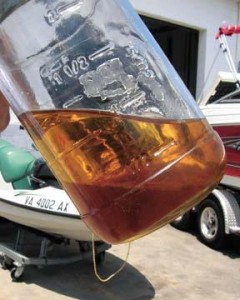Ethanol: Fine for Cars, Not for Boats

If you’ve been paying any attention to boating industry periodicals and other information sources, you’ve probably heard about the rise of ethanol fuel blends. These fuels, produced from grains such as corn, are mixed with standard petroleum to create a cleaner-burning end result. Auto owners are understandably excited about this development as it could mean a reduction in dependence on foreign oil and a stopgap solution until other alternative sources – such as electric – become more viable.
Many boat owners, on the other hand, have pointed out that ethanol and outboard engines don’t mix. Unlike cars, which by their very nature feature a high rate of fuel turnover, boats often see long periods of disuse. If a fuel with a high blend of ethanol sits dormant inside the fuel system too long, the results can be disastrous. Ethanol acts as a solvent – anathema to fuel tanks and lines. It can breakup the varnish deposits in the engine, sending them through the fuel filters to wreak havoc on the injectors.
At this moment in time, it remains rather easy for a boater to ensure that he or she doesn’t fall victim to a high-ethanol blend. Make sure that your fuel retailer lists the percentage of ethanol in a given blend. E10, which includes 10 percent ethanol, is widely considered safe for use in small boats. Anything more than that could be risky. Remember that in order to keep your outboard motor running with efficiency and longevity, you should stick with a proven product such as Yamaha oil.


Comments